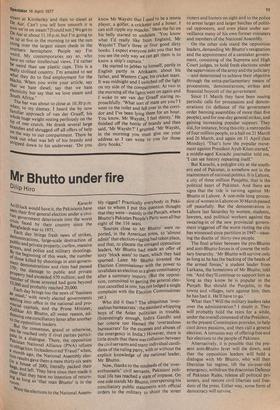Mr Bhutto under fire
DiliP Niro
Karachi Asitlluck would have it, the Pakistanis have en their first general election under a civi'Ian government deteriorate into the worst crisis faced by their country since the
angladesh war in 1971. Each day brings fresh news of strikes, demonstrations, large-scale destructionof Public and private property, curfew, massive 7rrests, and police and military shootings.
Y the beginning of this week, the number
Of those killed by shootings in anti-govern111, ent demonstrations and riots had passed ISO; the damage to public and private Property had exceeded 870 million; and the ?umber of those arrested had gone beyond '5,000 and probably reached 20,000.
Each day brings too the news of 'business
as11,suai,' with newly elected governments ,,„ v7""ng into office in the national and pro , Inclal capitals, and the Prime Minister, d"I"ar Ali Bhutto, all sweet reason, adt ressulg one conciliatory ° the opposition leaders.
letter after another
can But the consensus, grand or otherwise, p be reached only if rival parties particihate in a dialogue. There, the opposition ,raktstan National Alliance (PNA) a(° oblige him Its leaders criedFraud when, ti I the National Assembly nonth ago, refuses
. y eke
,,en results gave them a mere thirty-six seats 'g° a house of 200), literally packed their ''and left. They have since then made it ,._`ear that they have no intention of returning as long as 'that man Bhutto' is in the room.
Were the elections to the National Assem bly rigged ? Practically everybody in Pakistan to whom I put this question thought that they were—mainly in the Punjab, where Bhutto's Pakistan People's Party won all but eight of the 116 seats.
'Sources close to Mr Bhutto' were reported, in the American Press, to 'almost admit' that election-rigging had taken place, and that, to placate the enraged opposition leaders, Mr Bhutto had made an offer of sixty `block seats' to them, which they had spurned. Later Mr Bhutto invested the Election Commissioner with the power to invalidate an election in a given constituency inquiry.
after a summary . (But the opposi(ion, committed to getting the general election cancelled in taro, has not lodged a single complaint with the Election Commissioner yet.) Who did it then ? The ubiquitous 'overzealous bureaucrats' : the standard whipping boys of the Asian politician in trouble. (Interestingly enough, Indira Gandhi and her coterie too blamed the 'overzealous bureaucrats' for the excesses and abuses of the emergency in India.) However, there is little doubt that there was collusion between the civil servants and many individual candidates of the ruling party, with or without the explicit knowledge of the national leader, Mr Bhutto.
Now, thanks to the misdeeds of the 'overenthusiastic' civil servants, Pakistani political life has reached a state of impasse. On one side stands Mr Bhutto, interspersing his conciliatory public statements with official orders to the military to shoot the street rioters and looters on sight and to the police to arrest larger and larger batches of political opponents, and even place under surveillance many of his own former ministers and members of the National Assembly.
On the other side stand the opposition leaders, demanding Mr Bhutto's resignation and the appointment of a caretaker government, consisting of the Supreme and High Court judges, to hold fresh elections under the supervision of the army and the judiciary —and determined to achieve their objective through the extra-parliamentary means of processions, demonstrations, strikes and financial boycott of the government.
Since 11 March they have been issuing periodic calls for processions and demonstrations (in defiance of the government order banning assemblies of more than five people), and for one-day general strikes, and gaining increasing popular support. They did, for instance, bring this city, a metropolis of four million people, to a halt on 21 March and 26 March, and again on 11 April (last Monday). 'That's how the popular movement against President Ayub Khan started,' a middle-aged Karachi journalist told me, 'I can see history repeating itself.'
But Karachi, a polyglot city at the southern end of Pakistan, is somehow not in the mainstream of national politics. It is Lahore, a city of three million Punjabis, that is the political heart of Pakistan. And there are signs that the tide is turning against Mr Bhutto in Lahore. A one-mile long procession of women in Lahore on 30 March passed off peacefully. But the demonstration in Lahore last Saturday by women, students, lawyers, and political workers against the swearing-in of the new provincial government triggered off the worst rioting the city has witnessed since partition in 1947—causing the deaths of thirty-two people.
The final arbiter between the pro-Bhutto and anti-Bhutto forces is of course the military hierarchy. `Mr Bhutto will survive only as long as he has the backing of the heads of the armed forces,' a student leader from Larkana, the hometown of Mr Bhutto, told me. 'And they'll continue to support him as long as they know he is popular in the Punjab. But should the Punjabis, in the towns and villages, turn against him, then he has had it. He'll have to go.'
What then ? Will the military leaders take over the administration ? I doubt it. They will probably hold the reins for a while, under the overall command of the President, as the present Constitution provides, to help cool down passions, and then call a general election. A tortuous way of offering free and fair elections to the people of Pakistan.
Alternatively, it is possible that the present anti-Bhutto fever will die down, and that the opposition leaders will hold a dialogue with Mr Bhutto, who will then liberalise his regime, lift the six-year-old emergency, withdraw the draconian Defence of Pakistan Rules, release all political prisoners, and restore civil liberties and freedom of the press. Either way, some form of democracy will survive.






































 Previous page
Previous page